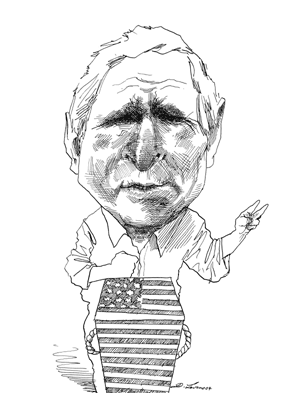In these last weeks of turbulent events, the single most significant has not been the financial crisis, not the fall of a governor, not the passing of the fifth year of the war without end in Iraq. It has been an American president’s formal blessing of the use of torture.
That was what President Bush did in early March when he vetoed legislation prohibiting the use of brutal methods of interrogation by American intelligence agents. His action was quickly overtaken by other news. But in its redefinition of American values—of the American character—it had profound implications.
I grew up believing that Americans did not torture prisoners, as Hitler’s and Stalin’s agents did. There were rogue episodes of American brutality, but to make torture a national policy? Unthinkable.
No one should be in any doubt that torture was what President Bush had in mind. No one should be fooled by Orwellian talk of “enhanced interrogation techniques.”
What Congress sought to outlaw was such things as hanging prisoners from the ceiling by their wrists, beating them, depriving them of food and water, preventing them from sleeping for days, keeping them in freezing temperatures, using electric shocks on them, and subjecting them to waterboarding—an almost-drowning technique that was used by the Inquisition and by Japanese soldiers who were successfully prosecuted for it by the United States after World War II. Torture.
All such methods are prohibited by the Army Field Manual. They are barred by international conventions that the United States has ratified. After the scandal of abuse at Abu Ghraib, Congress reiterated the ban in legislation covering the US military. What President Bush vetoed was a bill to extend the explicit, reiterated ban to CIA agents.
In announcing the veto, Mr. Bush said that “the program”—his euphemistic term for interrogation methods used in secret CIA prisons at “black sites” on foreign soil—had produced information that exposed planned terrorist attacks. He made specific claims: that “the program helped us stop a plot to strike a US Marine camp in Djibouti,” for example, and “a plot to hijack a passenger plane and fly it into Library Tower in Los Angeles.” He offered no evidence to support these claims. Nor is there proof that they are false. But skepticism is surely in order for self-serving assertions by a president who has misled the country about so much in his war, including the use of torture.
Senator John D. Rockefeller IV, the chairman of the Senate Intelligence Committee, who has sometimes been criticized for being too easy on the President, said of Mr. Bush’s claims:
I have heard nothing to suggest that information obtained from enhanced interrogation techniques has prevented an imminent terrorist attack. And I have heard nothing that makes me think the information obtained from these techniques could not have been obtained through traditional interrogation methods used by military and law enforcement interrogators. On the other hand, I do know that coercive interrogations can lead detainees to provide false information.
The corrupting effects of the adoption of torture as an American practice have been widespread. First of all, on the law. The Justice Department’s Office of Legal Counsel, which makes binding interpretations of the law for the federal government, issued secret opinions defining torture away to the vanishing point, saying it must be equivalent in pain to “organ failure, impairment of bodily function, or even death”—and adding that Congress could not stop the President from ordering the use of torture. (The whole idea of secret official opinions defining the law should be anathema in a free republic, one that has boasted from the beginning of having a government of laws, not men. Secret laws are the hallmark of tyrannies.)
The Justice Department opinions were not abstractions. They were immediately taken up by political appointees at the Pentagon and led directly to the torture of dozens of prisoners and the killing of some at Bagram Air Base in Afghanistan.
Torture has had corrupting effects on our politics, too. Most Republicans in Congress have defended President Bush’s claim of the right to use such methods, evidently as a matter of political solidarity. The corruption has even touched the man who more than anyone has been a symbol of resistance to torture, John McCain. Senator McCain led Congress in 2005 to pass the legislation reiterating the ban on the military’s use of torture. But when it came to extending the ban to intelligence agents in this year’s Intelligence Authorization Act, he sided with the President. It was as if he were saying that the North Vietnamese who so cruelly tortured him as a prisoner were war criminals if they were soldiers—but not if they were intelligence agents.
Language has been corrupted, too. On March 9, the CIA’s director of public affairs, Mark Mansfield, said in a letter to the editors of The New York Times that the lawfulness of the agency’s interrogation methods “has been confirmed by the Justice Department.” In other words, the CIA still relies for legal approval on the politicized department that approved torture in the first place. The devil citing Satan’s scripture.
Advertisement
George W. Bush can seek his God’s mercy for trying to legitimize torture by Americans. But here on earth he cannot escape judgment. For me he will always be the Torture President.
But the rest of us do not have to resign ourselves to being a Torture Nation. The Washington Monthly devoted its current issue to the subject of torture as American practice, publishing brief essays by figures across the political spectrum. Colonel Lawrence B. Wilkerson, US Army (Ret.), who was chief of staff to Secretary of State Colin Powell, wrote:
We must start now to recognize our crimes and our complicity. We are all guilty, and we must all take action in whatever way we can. Torture and abuse are not American. They are foreign to us and always should be. We need to exorcise them from our souls and make amends.
—April 2, 2008
This Issue
May 1, 2008




